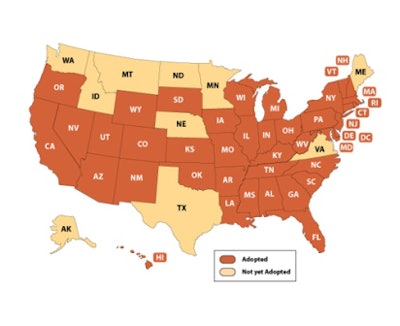 46 states and the District of Columbia have adopted the Common Core State Standards in math and/or English language arts.
46 states and the District of Columbia have adopted the Common Core State Standards in math and/or English language arts.It’s widely understood that implementation of the Common Core State Standards (CCSS) is going to require collaboration between public K-12 systems and higher education institutions to help ensure the K-12 curriculum reform is on track for the 2014-15 academic year.
In a national survey report released recently by the Center on Education Policy at George Washington University, the states that have adopted the CCSS indicate that their K-12 and higher education systems have begun working together to implement the standards. Of the 40 states whose state education officials responded to the survey, K-12 officials in 16 states indicated that their states are facing major challenges, and officials in 19 states reported minor challenges in collaborating with higher education.
Center on Education Policy officials say their report, “Year 3 of Implementing the Common Core State Standards: State Education Agencies’ Views on Postsecondary Involvement,” drew its results from a survey conducted in the spring of 2013 that targeted state deputy superintendents or their designees. A total of 46 states and the District of Columbia have adopted the CCSS in math, English language arts, or both.
“This is the fifth report in a larger series and all of the information that we provide was gathered by a state-level survey…,” said Dr. Jennifer McMurrer, CEP’s senior research associate and a co-author of the report. “We interviewed the state education officials who were charged with generally overseeing K-12.”
The higher education focus of the CEP report recognizes that “postsecondary institutions have an enormously important role to play in CCSS implementation for teachers, students and parents,” according to CEP Executive Director Maria Ferguson.
McMurrer noted that “one of the primary goals of the Common Core is to ensure students who graduate from high school are both college and career ready.” Higher education institutions stand to benefit from the CCSS if they can help K-12 districts increase the college readiness of their graduates, she said.
“If state agencies and postsecondary [institutions] can collaborate and come to a common understanding of what it actually means to be college and career ready, theoretically, students entering these postsecondary institutions might be more ready for the coursework and there may be less need for remediation,” McMurrer said.
Thirty-one of the 40 state education agencies (SEAs) surveyed reported that postsecondary institutions have evaluated or will evaluate the Common Core standards in English language arts (ELA) and math to determine if mastery of the standards proves college readiness. Twenty-one of the responding SEAs indicated that higher education institutions in their state are mulling over whether to use performance results on the CCSS-aligned tests to make student placement decisions, and another 21 states are considering whether to use CCSS test performance to exempt students from remediation courses.
Another important higher education concern with the CCSS is how well teacher preparation programs are helping student and working teachers teach under the new standards, according to the CEP report. Twenty-seven SEAs reported that aligning the content of their respective state college and university teacher preparation programs with the CCSS was challenging. Nearly all, or 37, of the SEA respondents have offered or are going to offer Common Core briefings for school of education faculty in colleges and universities. A majority of SEAs also indicated they have worked with their higher education institutions to align the academic content of teacher preparation programs with the CCSS, or are expecting to do so.
Arthur McKee, the managing director for teacher preparation studies at the National Council on Teacher Quality, said it’s no surprise that states are finding the task their schools of education are undertaking to align the content of their teaching preparation programs with that of the Common Core standards to be challenging.
“The level of rigor is much higher than where most state standards have been up until this point,” said McKee. “So it’s going to be more demanding for elementary teachers, in particular, in terms of their math content knowledge.
“It’s also going to be more demanding again for elementary school teachers in terms of their overall breadth of knowledge,” McKee added.
McKee said the National Council on Teacher Quality (NCTQ) has documented some of the progress states have made in their Common Core efforts to prepare student teachers and provide professional development for working teachers.
“From what we found when we looked at over a thousand institutions that are preparing teachers, particularly in the elementary grades, is that there’s a lot of work that needs to be done,” he said.















